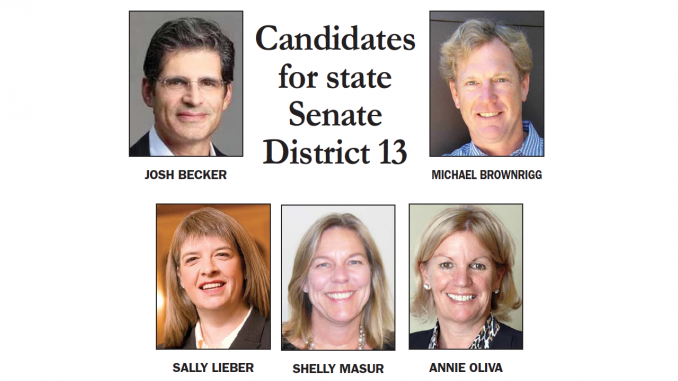
BY EMILY MIBACH
Daily Post Staff Writer
None of the candidates who want to replace termed-out state Sen Jerry Hill say they would vote for SB50, a bill that would pre-empt local zoning control to allow for more housing near transit and jobs.
But three of them said they would be able to support the controversial bill if certain changes were made.
The five candidates are running in the March primary to succeed Hill, who represents the mid-Peninsula from South San Francisco to Sunnyvale. The top two vote-getters will go on to the November 2020 election.
The Post asked the five candidates about their views on housing and whether they would support SB50, a bill by Sen. Scott Wiener, D-San Francisco, that has been put on hold until January.
Former Assemblywoman Sally Lieber of Mountain View and Redwood City Councilwoman Shelly Masur were more accepting of SB50 than the other three, but would have some amendments. Masur said SB50 has done a good job on forcing cities to look at housing. However, she has two amendments for the bill before supporting it. Those would give cities a period of time to develop their own transit-oriented development plan that meets the goals of SB50, and if cities don’t make a plan, then SB50 would automatically apply.
Amendments
Masur’s other amendment would be to change the exemption for counties with a population under 600,000. Weiner had amended the bill so it would only apply to counties over 600,000, meaning it would only apply to 15 out of the state’s 58 counties.
Sen. Mike McGuire, D-Healdsburg, demanded the exemption in return for his vote at the committee level. The exemption means the counties he represenents would not have to abide by SB50.
Lieber, like Masur, appreciates how the bill has “kickstarted” the housing conversation in the area.
Lieber said it would be better to have local governments put forward their own housing solutions, but that just hasn’t happened on a wide enough scale. If the area’s jobs-housing imbalance continues as is, “our region will be strangled by its own success.”
With her reluctant support, Lieber said she would make sure amendments are made to SB50, her three key amendments would be: mechanisms for allowing some local decision-making, protections to prevent displacement of low-income residents living in existing housing and “ironclad” protections for open space.
Millbrae councilwoman Annie Oliva said that having housing on transit corridors is “essential” but added that SB50 “is restrictive and does not meet the unique needs each city may have.” She added that more “discretion and decision making ability” is needed at the local level in the current version of SB50.
Oliva said amendments need to be made so local officials can “customize” housing projects to meet their community’s needs.
Local control
Menlo Park resident and entrepreneur Josh Becker and Burlingame Mayor Michael Brownrigg are both also apprehensive of the idea of eliminating local control.
Becker said he cannot currently support SB50, saying it negates local control, allowing state political decisions to override local voters’ decisions.
Becker added that both San Mateo and Santa Clara counties have passed taxes to help fund projects for subsidized housing. Becker also said that other cities are working on their own measures to fund projects.
“So we don’t need sticks to push many of the Peninsula cities,” Becker said.
Brownrigg said local cities, such as Redwood City, Sunnyvale, Mountain View, San Mateo and San Carlos, have already added greatly to their housing stock, near public transit, all without SB50.
Brownrigg also pointed to Burlingame’s own zoning plan, which is intended to add 2,600 new homes in locations where there are now commercial buildings such as the area around the Millbrae Bart station.




It’s sad that these 5 newbies have more thoughts on SB50 than current Assemblyman Marc Berman, who doesn’t have a position.
Every one of them will change their tune when a donor hands them a check.